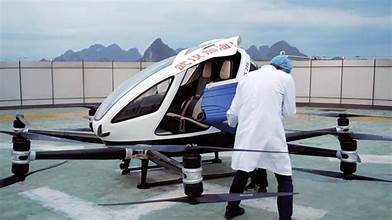In a groundbreaking convergence of technology and healthcare, medical drones carrying blood are revolutionizing the speed and efficiency of emergency medical responses. These unmanned aerial vehicles are proving to be indispensable in situations where every moment counts, such as delivering crucial blood supplies to remote or disaster-stricken areas.
Companies like Zipline have pioneered the use of medical drones to transport blood with unprecedented speed. Operating autonomously, these drones navigate challenging terrains to reach their destinations, ensuring timely delivery of life-saving blood transfusions. The ability to cover long distances in a fraction of the time it takes traditional methods has the potential to dramatically reduce mortality rates in emergencies.
The impact of medical drones carrying blood extends beyond geographical barriers, offering a lifeline to communities with limited access to healthcare infrastructure. As this technology continues to mature, we are witnessing the dawn of a new era in healthcare logistics, where the skies become a conduit for swift and reliable delivery of critical medical resourceses.

Future of Healthcare with Medical Drone Research
In the relentless pursuit of improving healthcare delivery, the spotlight has turned to the skies, where medical drone research is soaring to new heights. Research initiatives worldwide are exploring the untapped potential of drone technology to revolutionize how we approach medical logistics. These unmanned aerial vehicles are not just airborne gadgets; they represent a cutting-edge solution to overcoming geographical barriers and ensuring swift access to critical medical supplies.
Researchers are delving into areas such as payload capacity, autonomous navigation, and real-time monitoring to enhance the capabilities of medical drones. This includes the development of advanced sensors and precision technology to safely transport delicate medical payloads. The ongoing research is paving the way for faster response times in emergencies, efficient delivery of life-saving medications, and improved healthcare accessibility in remote regions.
As we witness the evolution of medical drone research, it becomes clear that these aerial innovations hold the potential to reshape the future of healthcare, making timely and effective medical interventions a reality, even in the most challenging environments.
The Impact of Fixed-Wing Medical Drones
In the fast-paced world of medical logistics, fixed-wing medical drones are revolutionizing the delivery of critical supplies. Companies like Wingcopter are leading the charge, deploying unmanned aerial vehicles with fixed wings to overcome logistical challenges and reach remote areas swiftly. Unlike their vertical takeoff and landing counterparts, fixed-wing drones offer increased range, payload capacity, and stability during flight.
These drones are not merely technological marvels; they represent a lifeline for communities with limited access to healthcare. Their horizontal takeoff and landing capabilities make them ideal for covering extensive distances, especially in emergency situations or disaster-stricken regions. By seamlessly navigating challenging terrains, fixed-wing medical drones are elevating the efficiency of medical deliveries, ensuring timely access to vital medications and resources. As we embrace this era of innovation, fixed-wing medical drones stand as a symbol of progress, promising to reshape the landscape of healthcare accessibility across the globe.
The Rise of Medical Drone Companies
In recent years, medical drone technology has emerged as a game-changer in the healthcare industry. Several innovative companies are spearheading the development and deployment of drones to enhance medical services and save lives. One such trailblazer is Zipline, which delivers critical medical supplies to remote areas in record time. Their drone fleet ensures swift transportation of blood, vaccines, and other necessities, overcoming logistical challenges.
Another noteworthy player is Matternet, focusing on medical payload transport. Matternet’s drones are designed to carry medical samples between healthcare facilities, providing a rapid and efficient solution for diagnostic testing. Additionally, Vayu, a company harnessing drone technology for medical deliveries, specializes in transporting temperature-sensitive medications and vaccines to difficult-to-reach regions.
As these companies continue to innovate, the integration of medical drones promises to revolutionize healthcare delivery, particularly in remote or disaster-stricken areas where timely access to medical supplies is critical for saving lives. The future of healthcare is taking flight with the remarkable advancements of medical drone companies.